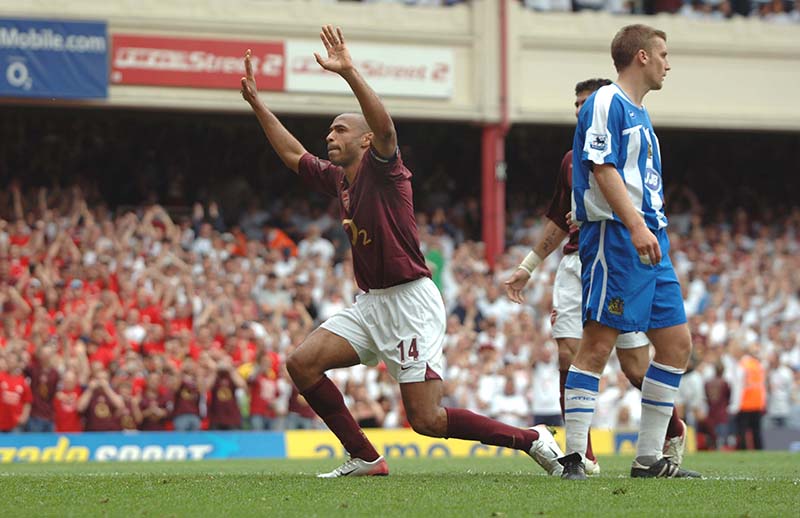
From Doncaster loanee Theo Streete’s sole Football League strike to Thierry Henry capping off his Highbury love affair, being the last or first to score at a ground secures your place in history
January 6 ~ There was a lad who lived down my dad’s road who grew up to be a footballer. A capable left-back, Jamie Green had four years in the Football League with Rotherham before injuries nudged him down the pyramid. The sort of blink and you miss it career that would fade away everywhere but a listing in a tattered Rothmans. At least it would have been, but one Saturday afternoon in May 2008 he arrived in the penalty area at just the right time to score the last ever goal at Millmoor.
A lot of accolades in football can be surpassed; trophies are only held for a year while players can score more goals, make more appearances, be younger on debut or older on retirement. Yet scoring the final competitive goal at a football ground, or the first one at a new stadium, is a very finite honour – one of few in football from which you can never be displaced.
In November Joe Pigott became the latest player to secure a personal entry on a stadium’s Wikipedia page, by scoring first on Wimbledon’s return to Plough Lane. It was the recommendations of the Taylor Report that prompted the Dons’ departure from that same street 29 years previously. In fact, more than a third of the clubs who constituted the Football League at the time of the report’s release have since swapped tired old tumble-down homes for modern concrete amphitheatres.
If your club are among those to have moved, you’ll recognise the hope that your ground’s final goal will be scored by a club stalwart – someone fitting to wrap up the decades of dedication you and your team have given to a particular patch of grass. But it doesn’t always go that way; it may not even be one of your own players.
It was Ipswich’s Jon Stead who scored last at Ninian Park, Bristol Rovers’ Mike Davies who bravely did for The Den. Southampton’s Michael Svensson was last to net at Maine Road. The true grim reaper of grounds, however, was Ian Wright. Not content with wielding his scythe across the original Plough Lane in 1991 with a spectacular hat-trick, six years later he flung himself across a fittingly muddy six-yard box to score the final goal at the Baseball Ground too.
Thankfully football’s gods haven’t always shown such disdain for romance; some grounds were graced with fitting finales. Southampton cult hero turned amateur epidemiologist Matt Le Tissier brought the curtain down on The Dell with a spectacular match-winning half-volley, and it was fan favourites Thierry Henry, John McGinley and John Hendrie who struck the final goals at Highbury, Burnden Park and Ayresome Park respectively. The last time the ball found the net at Darlington’s Reynolds Arena it did so courtesy of a Kettering own goal.
As old grounds crumble, new stadiums are often projected as indicative of new eras. Stefano Eranio scoring first at Pride Park could perhaps be seen as reflective of football’s mid-1990s culture shift, but a remarkable number of new grounds have been christened by wise old heads. Niall Quinn ushered in the Stadium of Light with an opportunistic interception, Trevor Sinclair volleyed in the first goal at the Etihad, while Brian Deane – who seems far too much a man of the last century to have done so – struck first at Leicester’s Walkers Stadium.
Had Andy Hunt not scored a late consolation goal for West Brom in the final game of the 1996-97 season then Graham Kavanagh would have the unique distinction of scoring the last goal at Stoke City’s old Victoria Ground, as well as the first at their current stadium. Instead, only Adebayo Akinfenwa has scored goals which have both christened and closed out a stadium. Having drawn the ball into his orbit long enough to score the Liberty Stadium’s opener in August 2005, he also struck against Rotherham to end Don Valley Stadium’s stint as a football ground seven years later.
For proven goal-getters like Akinfenwa, Craig Bellamy (last goal at Elm Park) or Jimmy Floyd Hasselbaink (first goal at St Mary’s), these strikes have probably been long forgotten; footnotes in a catalogue of career goals. But for the more unlikely scorers – players such as Theo Streete (whose ten-game professional career included scoring the final goal at Belle Vue) and Jamie Green – they offer more. A rare opportunity for lifelong notoriety in fleeting football careers that would’ve otherwise passed by all but family members. Oh, and people whose parents happen to live up the road. Glen Wilson
Photo by Colorsport
This article first appeared in WSC 405, January 2020. Subscribers get free access to the complete WSC digital archive – you can find out more here
